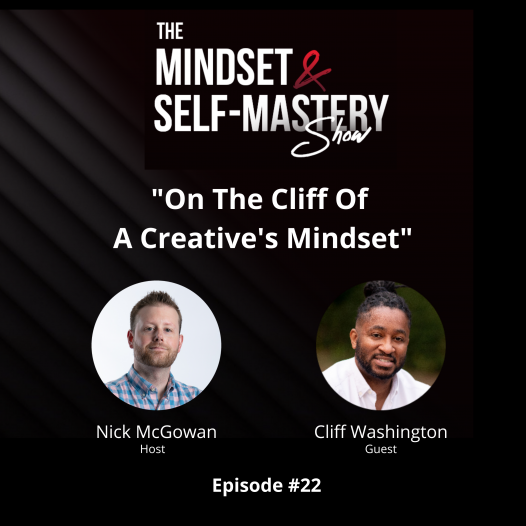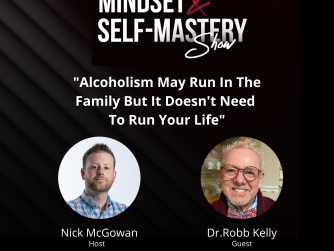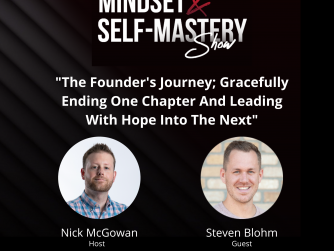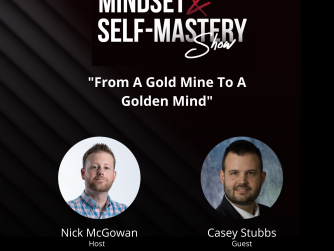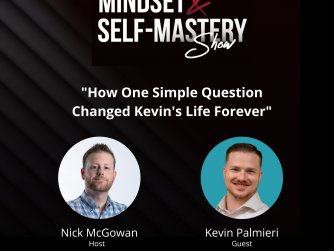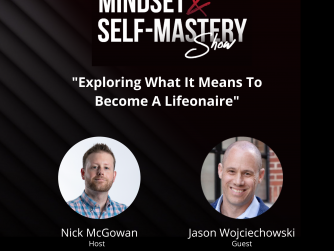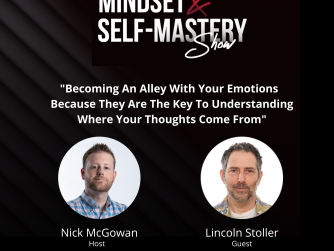Episode summary: Cliff is a podcast host and an art director/brand strategist who’s worked in or around advertising and creative agencies for many years.
We discuss what it was like growing up in upstate New York then spending 15+ years in the city and how he went from growing up in church to exploring how other religions and people lead their lives ultimately helping him to shape the life he leads now.
Guest Name & Bio: Cliff, share a bit about yourself with us!
“I’m a multi-hyphenate. A creative leader, art director, designer, strategist, illustrator, beatmaker, podcaster, and speaker (did I miss anything? lol).
I was a creative professional in NYC for 16 years, I worked in fashion, radio, advertising, media, and entertainment to name a few industries. I’ve worked with companies including Townsquare Media, ViacomCBS, Essence Media, and Hot97.
I’m Constantly seeking to know myself better and heal from the past. Love a good belly laugh too.”
EPISODE TRANSCRIPTION
[Nick McGowan] that we have where you know we weretalking a bit about the agency life and
[Nick McGowan] how there’s some times where it just itcould be stressful super stressful so how do
[Nick McGowan] you take that confidence that you have inthat way to be able to kind
[Nick McGowan] of pull yourself back and all right cooli’m here no pressure let me just rock
[Nick McGowan] and roll with that do you feel likeyou can translate that into other things now
[Nick McGowan] or or not [Nick McGowan] yeah yeah there’s uh confidence that comes fromjust knowing your and whatever it is and
[Nick McGowan] just going i i know that i knowthe things that i know so i’m bringing
[Nick McGowan] these into the mix how do you workwithout your newer role and the projects
[Nick McGowan] that you have kind of managing your mindsetin that sort of light
[Nick McGowan] hm [Nick McGowan] that’s [Nick McGowan] hm that’s a good point with boundaries sinceeverything happened with covid and people either went
[Nick McGowan] hybrid and remote working and working in anoffice and having to go in every once
[Nick McGowan] in a while or the other people thatall just are completely remote at this point
[Nick McGowan] it can feel like you’re on an islandand it can feel like you’re doing things
[Nick McGowan] by yourself but there is you got tobe able to stand up and say something
[Nick McGowan] and set those boundaries i i talked todifferent people at times that uh feel like
[Nick McGowan] they’re abused by the people they work withbecause they just expect that they’re always on
[Nick McGowan] doing the things and for the most partbeing in a newer role there’s a balance
[Nick McGowan] to that where like you don’t know whatthat what everybody else is doing you know
[Nick McGowan] you don’t know how everybody else is workingso how are you balancing your mindset right
[Nick McGowan] now kind of figuring out the lay ofthe land what you should what you shouldn’t
[Nick McGowan] be doing and actually what aligns with youwithout just cutting and running and being
[Nick McGowan] like map i don’t like any of thisi’m out
[Nick McGowan] okay yeah [Nick McGowan] yep [Nick McGowan] yeah [Nick McGowan] well for the most part you gotta hit someof it and i think the boundaries thing
[Nick McGowan] is really what we’re talking about we’re goingthrough because there are boundaries that you can
[Nick McGowan] set within yourself but being brand new toa place you can be unsure of what
[Nick McGowan] the boundary should be and not wanting tobe like hey i know i’m new here
[Nick McGowan] but i don’t want to do that withoutunderstanding like how to go about it then
[Nick McGowan] you toss them the mixed freelance because atthat point somebody can’t say hey you’re w
[Nick McGowan] two this is what you have to doit’s kind of a freelance state and it’s
[Nick McGowan] interesting how things have moved in that directionbecause there are a lot of people that
[Nick McGowan] are like look i don’t want to workhere anymore i’m gonna go freelance or i’m
[Nick McGowan] gonna go do this or do that andi think to get outside of the boundaries
[Nick McGowan] a bit i think there are certain peoplethat are really frustrated in what they’re doing
[Nick McGowan] and don’t know exactly what they want todo but they’re afraid to dig deeper into
[Nick McGowan] it so they just say i’m out andi think it’s a it’s a mindset thing
[Nick McGowan] go for it [Nick McGowan] fit [Nick McGowan] yeah [Nick McGowan] six [Nick McGowan] yeah [Nick McGowan] sure yeah without constantly looking at isthe grass green or somewhere else without being
[Nick McGowan] able to run away from it now welli know that you um from what i
[Nick McGowan] know of you you are on the sideof service and love instead of going at
[Nick McGowan] somebody so for the people that are outthere that are kind of in similar spots
[Nick McGowan] and trying to work through that and figureout what their boundaries are but don’t really
[Nick McGowan] want to just instantly be like no fuckyou that’s not right doesn’t work with me
[Nick McGowan] how would you suggest they go about that [Nick McGowan] ahead [Nick McGowan] turn daddy what you actually grew up withor did you create that character like this
[Nick McGowan] is the a guy who says buck noand puts his foot down like where did
[Nick McGowan] stern daddy come from [Nick McGowan] oh [Nick McGowan] hm [Nick McGowan] yeah that seems like just a regional northeastthing we just kind of have a paranoia
[Nick McGowan] almost but just like innate oh so whydon’t you uh want you share a couple
[Nick McGowan] stories that come to mind or episodes inlife that have helped you kind of shape
[Nick McGowan] who you are today either from being inthe city or from when you grew up
[Nick McGowan] what [Nick McGowan] hm [Nick McGowan] yeah that’s a bunch of things that’s happenedall strung together to make you who you
[Nick McGowan] are um you’d even said that we’re allgrowing we’re all learning i wish that to
[Nick McGowan] be the case i hope that is thecase i feel there are certain people that
[Nick McGowan] just want to do more of that asthey grow up and as they learn there
[Nick McGowan] are also the other people that allow thingsto just beat them and just say well
[Nick McGowan] that’s that’s how life works and i justget beaten and i don’t want to explore
[Nick McGowan] i don’t want to keep exploring you keepexploring do you think that came from your
[Nick McGowan] parents did that come from where do youthink that came from
[Nick McGowan] six [Nick McGowan] wow okay [Nick McGowan] hi [Nick McGowan] you see hm [Nick McGowan] yip [Nick McGowan] oh [Nick McGowan] you can’t really just stop there with ayeah like there’s a lot more to it
[Nick McGowan] than that you know that’s that’s one ofthose things where some people say uh shitty
[Nick McGowan] things happen in threes or deaths happen inthrees or whatever but that is a legit
[Nick McGowan] it happened in three for you so howdid you how did you manage growing from
[Nick McGowan] there and as you look back now tenyears you know you you lost a couple
[Nick McGowan] major pieces one major piece in your lifeand then something that kind of un rooted
[Nick McGowan] everything from you so how do you howdid you manage your mindset through that course
[Nick McGowan] of the time and being able to lookat it now and just reflect upon it
[Nick McGowan] hey [Nick McGowan] yeah [Nick McGowan] the [Nick McGowan] yeah that’s an interesting thing with the meditationtoo i know a lot of people kind
[Nick McGowan] of fight with the meditation like going inall these thoughts like i just want to
[Nick McGowan] clear my mind but what you talked aboutit’s really that pursuit of clarity and being
[Nick McGowan] understanding of stuff could come through [Nick McGowan] yeah [Nick McGowan] yeah and you talked about it and youtalk to somebody you actually sat down you
[Nick McGowan] took that step to talk to somebody alot of people don’t and i i go
[Nick McGowan] to therapy i think everybody should you doyou know think about the time that
[Nick McGowan] you were able to spend actually talking throughsome of it even if somebody didn’t say
[Nick McGowan] anything back to you just being able toget that out process through some of that
[Nick McGowan] that helps how did that all relate toyour faith though
[Nick McGowan] hey [Nick McGowan] s [Nick McGowan] yeah [Nick McGowan] so [Nick McGowan] yeah [Nick McGowan] hm it’s so so interesting with um differentpeople play different roles in our lives and
[Nick McGowan] i’m there with you i think god givesus that wisdom knowledge and understanding and sometimes
[Nick McGowan] that can come from the weirdest spots somebodythat you run into in a grocery store
[Nick McGowan] could say something that’s in context of theirown conversation that answers one of your questions
[Nick McGowan] so in that sort of sense it’s coolto see to me at least it’s cool
[Nick McGowan] to see god work through those ways whereyou’re like what was that for me did
[Nick McGowan] i just catch that it’s it’s such anthe interesting thing to think that therapy is a
[Nick McGowan] no no uh i can understand like themoral side where the people are afraid like
[Nick McGowan] i don’t want to actually explore theshit that’s deep inside of me but you
[Nick McGowan] should just put dirt on it and getup kid go back um the weird
[Nick McGowan] thing with the religious side and i’m Christianand i i was in churches for a
[Nick McGowan] long time i didn’t really grow up inchurch but in my twenties and early thirties
[Nick McGowan] played worship lead guitar so it was inchurches and saw a lot of people kind
[Nick McGowan] of go through this stage of just wearingmasks but then being things outside of it
[Nick McGowan] i used to make jokes uh even catholicjokes cause i was raised catholic i was
[Nick McGowan] like man they’d all go in they’d talkabout bake sales and a couple things and
[Nick McGowan] i’d grab one of the pamphlets in theback and then they’d all walk outside and
[Nick McGowan] just smoke a cigarette and start yelling attheir kids and i remember being like what
[Nick McGowan] is this how does this make any sensewe can’t let people stop us from the
[Nick McGowan] truth so the truth that we believe tobe true is what we believe it to
[Nick McGowan] be without allowing other things to influence thatand you’re smart enough at this point to
[Nick McGowan] be able to look back and reflect onsome of those things so when you think
[Nick McGowan] of your faith now and all the stuffthat’s happened do you think that you have
[Nick McGowan] a stronger understanding of what faith actually meansto you or do you think there’s still
[Nick McGowan] more of that human side that you kindof battle through
[Nick McGowan] wow that’s interesting it seems like you’vedone a lot of exploring and we’ve kind
[Nick McGowan] of covered some of that that comes fromyour mom apparently the exploration side but to
[Nick McGowan] be able to actually take these pieces andkind of see what works and what doesn’t
[Nick McGowan] work for you and then kind of dosome of the deep work with that so
[Nick McGowan] when you think of doing just deep workin general on yourself and through the body
[Nick McGowan] of your own work over the past fifteentwenty years what do you find that you’re
[Nick McGowan] actively working on now that maybe you thinkwould have been too hard to conquer years
[Nick McGowan] ago [Nick McGowan] hm [Nick McGowan] hm [Nick McGowan] hm so what would you say would beone piece of advice that you would get
[Nick McGowan] for from somebody that’s on their path towardsself mastery
[Nick McGowan] well put man what an awesome way toput that and i appreciate being on the
[Nick McGowan] show today it’s been so great to catchup uh it’s crazy that we’ve already known
[Nick McGowan] each other for two years at this pointbut it’s been beautiful to watch the progression
[Nick McGowan] you’ve gone through even with this new gigand i always our conversation so thank you
[Nick McGowan] for being on with us today before welet you go where can people connect with
[Nick McGowan] you [Nick McGowan] perfect thank you again cliff it’s been apleasure
[Nick McGowan] we cannot forget that at all cliff thatwas in that was a great episode when
[Nick McGowan] you had me on your show that wasactually my first podcast as a guest so
[Nick McGowan] thank you for helping with that and youare a great host you ask i think
[Nick McGowan] at times better questions than i did soi appreciate that so everybody go check out
[Nick McGowan] his podcasts the notes are going to bein here and all that so thank you
[Nick McGowan] again cliff it was a pleasure ma’am [Cliff Washington] thank you nick i’m doing great how areyou
[Cliff Washington] hm [Cliff Washington] well yeah because yesterday i you know ikind of forgot it was friday um the
[Cliff Washington] week so in the middle of the weekWednesday i went to the city cause right
[Cliff Washington] now i’m in upstate new york i’m ona bit of a sabbatical from the city
[Cliff Washington] i’ve been there for sixteen years but iwent back wednesday for a conversation with this
[Cliff Washington] guy i know who’s well he used tobe executive creative director for um ad agency
[Cliff Washington] in new york and now he’s um inthe c suite as a chief experience design
[Cliff Washington] officer so he’s given a talk at ogilvyin new york and you know i saw
[Cliff Washington] it on linkedin and went down great dayhe’s a really great guy met a lot
[Cliff Washington] of great people did some good networking umbut y yeah that kind of messed up
[Cliff Washington] my week because when i came back itwas like you know the next day on
[Cliff Washington] thursday going back into the into the regularwork week and by the time like i
[Cliff Washington] said by the time i got the fridayit was just like man what day is
[Cliff Washington] it oh shoot it’s the weekend uh touh the next day is saturday wow and
[Cliff Washington] then you know it was another late nightlate agency night till like twelve o’clock at
[Cliff Washington] night so that just throws me off [Cliff Washington] so my name is cliff washington i aman art director and brand strategist i currently
[Cliff Washington] work with agency ad agency out in californiafrom upstate new york and like i said
[Cliff Washington] um i was in the city for innew york city for sixteen years as a
[Cliff Washington] creative professional one thing that people may notknow about me is i’m the first and
[Cliff Washington] my immediate family to graduate college [Cliff Washington] i mean when i was a kid alli wanted to do was you know play
[Cliff Washington] play college basketball that’s what i remember themost so yeah i wanted to go to
[Cliff Washington] syracuse university and playing the carrier dome andhave jim ba heim for my coach but
[Cliff Washington] you know athletically that wasn’t the route andin terms of i mean my mom she
[Cliff Washington] w in college for me even more thanthan i did because you know we come
[Cliff Washington] from a very much working class background soum to be the first it was it
[Cliff Washington] was pretty cool i mean that was somethingthat was definitely on my mind going into
[Cliff Washington] college [Cliff Washington] oh well like in in high school it’sfunny cause i was always the tallest kid
[Cliff Washington] in my class until about i wanna sayeighth grade or so and i just kind
[Cliff Washington] of stopped growing and by the time ii got to like freshman university i was
[Cliff Washington] switching over from like power forward center toa shooting guard but all my skills i
[Cliff Washington] had developed throughout the years were more forlike a forward center position so all the
[Cliff Washington] ball handling and shooting and everything um youknow it was kind of like starting all
[Cliff Washington] over again and then i wasn’t necessarily likesuper focused on that uh because i split
[Cliff Washington] a lot of the time between like artand music and such um and then later
[Cliff Washington] on i had issues with one of thecoaches and him being a bit a jackass
[Cliff Washington] so um but at the end of theday it was more so that um i
[Cliff Washington] think my passion wasn’t necessarily in it toyou know to put in those hours for
[Cliff Washington] for that and um yeah it wasn’t necessarilythe path which is fine and also really
[Cliff Washington] battling a lot of confidence issues that waskind of half of what i dealt with
[Cliff Washington] playing basketball was not having confidence is funnybecause probably within the last three years playing
[Cliff Washington] basketball i developed confidence and acceptance in theskills that i have and it’s made me
[Cliff Washington] play like a lot better than i everused to which is odd you know all
[Cliff Washington] these years later [Cliff Washington] uhuh [Cliff Washington] so let me give you this analogy idon’t even know if it’s necessarily an analogy
[Cliff Washington] but one of the issues i had inbasketball was over thinking it’s like i could
[Cliff Washington] do a lot of working on my handlingum at home in the basement and then
[Cliff Washington] when i’m in the game and i’m thinkingto myself okay am i dribbling right let
[Cliff Washington] me make sure i don’t t dribble itoff my foot so as you over think
[Cliff Washington] about that then you dribble it off yourfoot so it can kind of be the
[Cliff Washington] same thing in business and and and whateverskill or craft is that you’re working on
[Cliff Washington] is like when you put the time inyou put the work and while you’re um
[Cliff Washington] practising whatever that skill of craft is youdon’t necessarily in the moment have to keep
[Cliff Washington] harping back on okay make sure i’m doingthis step one is right and then step
[Cliff Washington] two is like having the faith in yourselfto believe that since you put the work
[Cliff Washington] and you can kind of effortlessly part participatein and whatever it is that you’re doing
[Cliff Washington] and it will naturally your skill will naturallyshow
[Cliff Washington] i think the number one thing at thispoint is having an understanding of the role
[Cliff Washington] within the context of the particular company i’mworking at and you know knowing when to
[Cliff Washington] fight against the tide knowing when to rollwith the tide and that has again has
[Cliff Washington] to do with a sort of how howcan i say it a social awareness right
[Cliff Washington] you know w when it comes to thepolitics of a particular place and then also
[Cliff Washington] your own kind of self awareness and whatyou can deal with because uh you know
[Cliff Washington] there’s a lot of time there’s two routeswhen you’re at some place that presents challenges
[Cliff Washington] either it’s to just accept it and understandthat you can’t change something and not try
[Cliff Washington] to control it or take off and leaveyou know so understanding what i i can
[Cliff Washington] do and what i can’t do and wheni can um fight against the go against
[Cliff Washington] the grain and when i can’t go againstthe grain and i take some uh maneuvering
[Cliff Washington] and it takes some uh uh kind offeeling out the temperature which can be uncomfortable
[Cliff Washington] but you kind of have to dothat to be able to navigate a particular
[Cliff Washington] place and then also oh one of thebiggest things is boundaries and that’s i guess
[Cliff Washington] with any point in life but specifically inthe workplace to kind of let your boundaries
[Cliff Washington] be known to whether it’s your higher-upsor coworkers and because that’s one thing that
[Cliff Washington] people will test if it’s not set youknow pretty early on what your
[Cliff Washington] boundaries are [Cliff Washington] oh [Cliff Washington] well well for one sits on freelance uhthere’s a certain amount of flexibility that you
[Cliff Washington] can have um and also working on teamsyou know on the weekend if it’s not
[Cliff Washington] uh made known that there needs to behelp uh for a particular project or something
[Cliff Washington] i just said teams on do not disturband then i don’t get any messages and
[Cliff Washington] i’ll just get it sunday night or ormonday morning or something you know and it’s
[Cliff Washington] if it’s urgent enough they’ll just like callme or something like that um but in
[Cliff Washington] terms some of the other boundaries uh therewas another point i was gonna make but
[Cliff Washington] um i think it’s just about trying tohave his real conversations with people um and
[Cliff Washington] what was your question again i wannamake sure i hit it right
[Cliff Washington] okay [Cliff Washington] hm [Cliff Washington] oh got you uhuh [Cliff Washington] oh [Cliff Washington] yep [Cliff Washington] okay [Cliff Washington] okay so i remember what i was gonnasay i had a conversation with the old
[Cliff Washington] coworker um she is at the tamron hallshow now actually she was on the last
[Cliff Washington] episode of my podcast check it out whenyou get the chance to create his life
[Cliff Washington] spotify apple blah blah blah her name ismiranda uh johnson but you know i was
[Cliff Washington] asking her you know how she a similarquestion how do you deal with that type
[Cliff Washington] of stuff and her answer to me wasmy eyes are always on the prize you
[Cliff Washington] know in terms of her wanting to beable to start her own thing you know
[Cliff Washington] or a certain position that she has inmind for uh her future so that that
[Cliff Washington] kept her from just throwing her hands upand and just walking out the door uh
[Cliff Washington] because on her way to where she wantsto get to she has to be able
[Cliff Washington] to take care of her son you knowshe has a family and you know she
[Cliff Washington] just bought a house yada yada so youknow within reason she’s able to compartmentalize and
[Cliff Washington] separate also so she’s not stressing herself tothe point of of the job becoming like
[Cliff Washington] physically and and mentally unhealthy for her soum again to as much as she can
[Cliff Washington] to be able to focus on what herultimate goal is and to not let anybody
[Cliff Washington] kind of steal her joy in the processof getting there so that’s kind of what
[Cliff Washington] i try to do i try to likei’ll give you a concrete example it’s like
[Cliff Washington] when i get frustrated with something um andi’m about to like you know get to
[Cliff Washington] that point of like rage or something likethat i say you know okay is it
[Cliff Washington] worth bringing up this type of stress thistype of um cortisol induced uh discomfort for
[Cliff Washington] this thing is does this thing i’m beinggetting stressed about really have some type of
[Cliff Washington] huge bearing on my life you know whati mean um so it’s a balance between
[Cliff Washington] setting your boundaries and talking to people faceto face or over audio about um how
[Cliff Washington] you actually feel about something and you knowhow you you how you feel something like
[Cliff Washington] went down and what you felt was possiblynot right or whatever and then also being
[Cliff Washington] like you know this isn’t worth me umthis isn’t worth me getting my health all
[Cliff Washington] out of whack for and i need tofocus on my ultimate goal but at the
[Cliff Washington] same time you know being be making surethat you’re um keep your eyes open for
[Cliff Washington] other places that might be a little bitmore healthy for you
[Cliff Washington] yeah [Cliff Washington] right [Cliff Washington] that’s a good question so yes i eron the side of you know love and
[Cliff Washington] support um so i always try to leadwith that but um i also know that
[Cliff Washington] i have the disciplinary daddy in me thatwill come out if if prodded and pushed
[Cliff Washington] in that sort of way so that’s thelast resort but it’s there if if needed
[Cliff Washington] um but i think that there is acertain corporate speak that i try to also
[Cliff Washington] keep in my pocket where you know youcan kind of say fu without necessarily saying
[Cliff Washington] fu that try to like you know makesure people know where you stand but also
[Cliff Washington] um um i know that given m wherei’ve come from in my history and the
[Cliff Washington] things that i’ve dealt with i also haveto look at myself and say all right
[Cliff Washington] did you not understand something right in acertain situation or did you miss something or
[Cliff Washington] um i have to leave that door openthat you know maybe there was something i
[Cliff Washington] didn’t do right so if i can havethat clarity that can help me you know
[Cliff Washington] maybe not completely lose my cool if it’ssomething that i could have done better so
[Cliff Washington] once i kind of go through those filtersum i think that i get to a
[Cliff Washington] place where that helps guide me when itcomes to being less reactive but again keeping
[Cliff Washington] it in my back pocket if you knowi need to bring out stern daddy then
[Cliff Washington] it’s it’s there too [Cliff Washington] from a stern daddy you know like mymy dad grew up in uh east new
[Cliff Washington] york brooklyn and you know he grew upon he wasn’t like of the street but
[Cliff Washington] he grew up in the street so youhad the you had to really um set
[Cliff Washington] boundaries or you could be taken advantage ofreally easily and you know i grew up
[Cliff Washington] in upstate new york so you know thatvi that environment wasn’t up here so i
[Cliff Washington] just kind of had to you know iwould observe that every now and then and
[Cliff Washington] my dad when you know people would pushhim a little bit too far but then
[Cliff Washington] also being in new york and how tonavigate that environment you have to have a
[Cliff Washington] bit thicker skin and at the same timekind of keep your eye out for what’s
[Cliff Washington] coming around the corner [Cliff Washington] oh so i would say that part ofthe story arc of my life is um
[Cliff Washington] kind of being on a journey too isgonna sound kind of cliche and a woo
[Cliff Washington] but a journey of self discovery in thesense of um you know both my parents
[Cliff Washington] grew up well i i’ll start it outlike this my dad grew up in a
[Cliff Washington] time in new york city where um itwas very like multicultural immigrant neighborhoods so at
[Cliff Washington] the time the black families in brooklyn orat least that part of brooklyn where he
[Cliff Washington] was we’re kind of a minority grew uparound jewish people italians germans uh polish people
[Cliff Washington] uh my mom grew up in a moreuh predominantly black neighborhood so when they met
[Cliff Washington] in upstate new york and me and mysister came along we very much had the
[Cliff Washington] life that you know they wish they hadin in suburban slash uh kind of country
[Cliff Washington] area so growing up there was less [Cliff Washington] know white kids in school and in theneighborhood so um you kind of grew up
[Cliff Washington] with one notion of who you are butyou’re not necessarily treated the way that others
[Cliff Washington] are treated in this in the sense sothen when you go off to college and
[Cliff Washington] that was my first time being around youknow uh a decent number of black kids
[Cliff Washington] so then culturally you start to learn anotherthing and you kinda learn about that and
[Cliff Washington] soak that in but in a certain sensethat’s not necessarily who you are so it’s
[Cliff Washington] all this like kind of stuff all mixedin it wasn’t until i got to new
[Cliff Washington] york city where i started to find atrie down there where it was like it
[Cliff Washington] was like this mish mass ’cause it wasin k i went to school in connecticut
[Cliff Washington] so in connecticut and upstate new york thingsare just kind of can be stark and
[Cliff Washington] binary and new york city is just likethis you know it truly is a melting
[Cliff Washington] pot so i think within that environment wherei had to integrate so many sides of
[Cliff Washington] myself um i started to get a bettersense of who i am you know it’s
[Cliff Washington] not just you know me being uh blackedin a white neighborhood or a black kid
[Cliff Washington] in um uh a school within a blackcrowd but still us sticking out like a
[Cliff Washington] thorough sore thumb it was just this beautifulintegration in new york city where i started
[Cliff Washington] to feel like okay this is the sumtotal of who i am and it feels
[Cliff Washington] natural and i get to express myself andway without necessarily trying too hard in either
[Cliff Washington] direction and then that’s layered on top ofother things when it comes to you know
[Cliff Washington] different family trauma and everything and trying toheal from that and confidence issues and trying
[Cliff Washington] to heal from that so i think atthis point in my life that kind of
[Cliff Washington] makes up the sum total of of whoi’ve become and can obviously we’re all continuously
[Cliff Washington] developing and um you know that’s a nonstop journey ti you’re six feet under or
[Cliff Washington] whatever so i think that that’s uh adecent synopsis of you know where i’m at
[Cliff Washington] right now [Cliff Washington] to keep exploring yes i think that ummy mom in particular is someone who um
[Cliff Washington] she was def definitely she is more uhadventurous than my dad so she kind of
[Cliff Washington] planted that seed of discovery not necessarily selfdiscovery but i think uh discovery in general
[Cliff Washington] and then i think that you know mymy older sister was a bit of a
[Cliff Washington] hippie so um i think i got apiece of that from her and then i
[Cliff Washington] think uh going through ’cause i i soi grew up in church uh like four
[Cliff Washington] days a week you know like choir rehearsaland bible study and there was a
[Cliff Washington] soup kitchen that was ran on fridays andsunday service sometimes two services a day and
[Cliff Washington] when i saw that uh constantly break downin terms of infighting and backstabbing
[Cliff Washington] and all that stuff then that kind oftold me that all right all this what
[Cliff Washington] all this was built up to be isn’tturning out they’re not they aren’t who they
[Cliff Washington] say they are so it’s like how doi find my own path you know not
[Cliff Washington] to say that i’m like a um anatheist or anything like that but still it’s
[Cliff Washington] like how do i find my own spiritualpath so given that process of evolution within
[Cliff Washington] spirituality it’s like all right what other processesof evolution are there outside it’s the spiritual
[Cliff Washington] realm or how does the spiritual evolution connectto other forms of evolution so’s just kind
[Cliff Washington] of constantly going down that route and theni saw one of your questions with like
[Cliff Washington] it was basically what was a pivotal momentin your life or something or something that
[Cliff Washington] instigated the type of change and that wasprobably around twenty eleven twenty twelve when i
[Cliff Washington] think within like a a span of amonth or two uh my dad had passed
[Cliff Washington] my girlfriend had left me and i hadbeen laid off for my job so at
[Cliff Washington] that point it’s kind of like you knoweither you you know take a moment to
[Cliff Washington] stop seek some type of help or youknow you just kind of in uh spend
[Cliff Washington] the rest of your days in this yourown like personal hell or something like that
[Cliff Washington] so yeah [Cliff Washington] well i think that what helped a lotwas um deciding to go to therapy after
[Cliff Washington] all that and being in having someone tokind of unleash a lot of that on
[Cliff Washington] uh because i hadn’t really done that beforeand i think that it it can it’s
[Cliff Washington] very difficult to face those moments because umi think at the bottom of it you’re
[Cliff Washington] kind of you get to a point whereyou really have to look at yourself in
[Cliff Washington] the mirror and that’s kind of the thebiggest pain point for i think all of
[Cliff Washington] us um i don’t think anybody wants tolook at themselves and see certain deficiencies or
[Cliff Washington] pain or trauma because you know you don’tknow if you’ll uh survive that and very
[Cliff Washington] leg legitimately some people have not survived thatyou know they haven’t some people haven’t so
[Cliff Washington] i think and also what carried me throughthat was um i had a friend group
[Cliff Washington] at the time and i’m still friends withthem and you know we had all been
[Cliff Washington] kind of going through break ups at thetime too so we had kind of formed
[Cliff Washington] this lay miserables group that would meet upa couple times a week and uh gets
[Cliff Washington] get drinks at a local gentlemen’s kinda cocktailbar and i don’t mean gentleman’s as in
[Cliff Washington] like strip strip club place but just likeyou know old style like gentleman’s bar so
[Cliff Washington] you know having the therapy and friends tokind of release all that helped a lot
[Cliff Washington] and then i discovered meditation around that timeand you know i had read a little
[Cliff Washington] bit about it and was highly confused abouthow how it would be helpful and i
[Cliff Washington] had decided that you know i’ll try iti don’t know if it’ll help or not
[Cliff Washington] but i’ll i’ll try it and excuse meat first um i didn’t really see any
[Cliff Washington] type of benefit to it cause it wasjust like alright i’m just sitting here excuse
[Cliff Washington] me and i’m sitting here and ican’t really stop my thoughts and over time
[Cliff Washington] i was able to kind of settle intoum the practice in the sense of not
[Cliff Washington] trying to expect any particular thing out ofit and just be able to sit and
[Cliff Washington] um try to focus on the breathing andwhen my mind wandered just try to come
[Cliff Washington] back to the breath without blame or umor or putting myself down and then over
[Cliff Washington] time you know you start to notice thingschange you start to become more aware of
[Cliff Washington] of and also i think age too hasto do with age but you start to
[Cliff Washington] become more aware of uh either things thattrigger you or not to be as um
[Cliff Washington] triggered by certain things and um and whenthat happens you start to gain more confidence
[Cliff Washington] in who you are what you can dowhat you can’t do what you’re deficient in
[Cliff Washington] what you need to work on to relievethose deficiencies or what deficiencies are just kind
[Cliff Washington] of you know just part of who youare so yeah i think that was the
[Cliff Washington] basic process [Cliff Washington] oh and one one more thing is thatwhen it came to the the trauma you
[Cliff Washington] know if my father dying or losing thejob or losing uh a partner you know
[Cliff Washington] that type of morning just has to kindof have its own timeline and i i
[Cliff Washington] you know kind of constantly relearn that isthe worst thing to do is kind of
[Cliff Washington] hide from that type of grief because it’sgoing to have its day eventually and you
[Cliff Washington] just kind of have to go through it [Cliff Washington] um well the the way i grew upin church is is gonna be a weird
[Cliff Washington] way to relate it to it but umit wasn’t necessarily it wasn’t um they didn’t
[Cliff Washington] it wasn’t looked nicely upon to go totherapy basically at least in the the church
[Cliff Washington] that i went to so you know ifyou had to resort to going into therapy
[Cliff Washington] and this is within the church and alsowithin uh black culture you know is a
[Cliff Washington] moral failing if you can’t just kind ofdepend on praying praying it away and i
[Cliff Washington] think that revealed something to me in thesense that and this is kind of on
[Cliff Washington] along my spiritual past and the spiritualjourney is that um i found out that
[Cliff Washington] people would say that because they were afraidof what they might find uh if they
[Cliff Washington] really had to confront themselves instead of justpraying it away or saying that they were
[Cliff Washington] trying to prey it away and that kindof broke down the walls and when it
[Cliff Washington] came to the facade that i got fromyou know the church that i went to
[Cliff Washington] now on the other side in terms ofhow faith relates to therapy is that and
[Cliff Washington] i think i told my mom this beforeyou know if if god is responsible for
[Cliff Washington] everything then he’s also responsible for the knowledgeand wisdom of therapists so we shouldn’t have
[Cliff Washington] any type of qualms about you know seeinga therapist if um if you want to
[Cliff Washington] go that route and then also um youknow there’s nothing really new under the sun
[Cliff Washington] any feelings or emotions that a human hashad today you know a human has had
[Cliff Washington] ten thousand years ago you know to adifferent degree of human development so um i
[Cliff Washington] think that when i when i when itcomes to say buddhist philosophy or christian philosophy
[Cliff Washington] um i think i take the heart thatgod again has created people with the knowledge
[Cliff Washington] and the wisdom who aren’t necessarily your yourpriest or your pastor that can help you
[Cliff Washington] um heal from certain traumas and they don’teven have to believe themselves it’s just you
[Cliff Washington] know they were put in that position soyeah that’s that’s how i feel about that
[Cliff Washington] oh [Cliff Washington] oh yeah i absolutely have a stronger understandingof my faith which is you know it’s
[Cliff Washington] much more complicated than it was when iwas in in high school so um at
[Cliff Washington] this point i’m pretty much best way iwould have to put it is agnostic in
[Cliff Washington] the sense of um i feel like i’vetalked to enough people from a variety of
[Cliff Washington] cultures where i think that there are multipleroutes to the same thing you know whether
[Cliff Washington] you’re christian ah muslim buddhists hindu and ithink that was a big eye opener for
[Cliff Washington] me is that there’s so much wisdom andknowledge and and a variety of world religions
[Cliff Washington] that um i think i take heart inknowing that because you know there are similarities
[Cliff Washington] and some of the creation stories but alsobig differences too but i think it sort
[Cliff Washington] of grew my faith in the sense ofit wasn’t stuck to this one particular thing
[Cliff Washington] you know because yeah i think you knowwithin the christian faith like you know baptist
[Cliff Washington] feel that they have the one true wayto heaven protestants thing they have the one
[Cliff Washington] true way lutheran sing you know but knowingthat there are other religions that are trying
[Cliff Washington] to explain our existence and have different uhrules and philosophies that can be uh helpful
[Cliff Washington] and some hurtful but able to to pickfrom those to kind of form my spirituality
[Cliff Washington] and or at least continuously nourish my spiritualjourney is what i have in in my
[Cliff Washington] faith right now probably the one that ismost prominent in my life right now and
[Cliff Washington] you know i think in certain schools theydon’t necessarily uh consider themselves a religion but
[Cliff Washington] within buddhism it’s i think brought me acertain amount of peace and a certain amount
[Cliff Washington] of understanding of the world that um makesthe most sense to me at this point
[Cliff Washington] in my life right now the thing withinchristianity that interests me is one um having
[Cliff Washington] a better understanding of different text that talksabout that is kind of pre king james’s
[Cliff Washington] translation of things that jesus was talking abouti think that fascinates me and then also
[Cliff Washington] um i have this book that’s kind oflike afrocentric uh christianity or something like that
[Cliff Washington] but understanding it from that perspective to hasbeen a eye opening because of the way
[Cliff Washington] that christianity was kind of taught within mychurch growing up in america so seeing the
[Cliff Washington] breadth of understanding of christianity has been abig help
[Cliff Washington] i would say my own like deficiencies andfoibles when it comes to um over thinking
[Cliff Washington] or you know learning in a different waywhen it comes to traditional schooling cause that
[Cliff Washington] was a source of you know great shameand i think at this point in my
[Cliff Washington] life there’s just an acceptance around it anda better understanding of how i digest information
[Cliff Washington] so with that i can then participate inthings like say um understanding math from the
[Cliff Washington] point of business and budgeting it helps mebe able to get better at math overall
[Cliff Washington] than necessarily how it was taught in highschool through you know kind of the traditional
[Cliff Washington] institutional structured way of that they taught itand for some people that works but for
[Cliff Washington] me it didn’t but understanding from i guessthe real world um the real world perspective
[Cliff Washington] of being able to take care of amonthly budget or putting financial goals together or
[Cliff Washington] um you know what it takes to runa business and profit and loss and stuff
[Cliff Washington] like that i think something that i canget my hands around in my own personal
[Cliff Washington] life makes that a little bit easier forme to participate in
[Cliff Washington] there is no for i feel for trueself mastery there’s no way around the pain
[Cliff Washington] you just have to walk through it whichis in itself can be traumatizing and very
[Cliff Washington] difficult and contest you to the limits ofyour ability but i think that is the
[Cliff Washington] only one true way to self mastery [Cliff Washington] same here